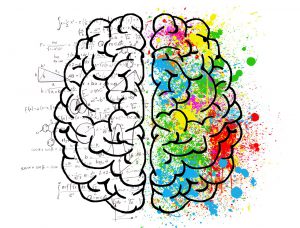by Dr. Michelle Sobon, Tuesday’s Child Staff Psychologist
Executive functioning (EF) is a set of neurological skills that are involved in figuring out how we are going to do what we want to do. Executive functioning difficulties are often misread as laziness, lack of knowledge, or willful noncompliance.

Research indicates that executive functioning skills statistically predict academic achievement (Naglieri & Rojahn, 2004). Often children with executive function deficits demonstrate low achievement in math calculation and reading comprehension. These are academic areas that require an individual to think about how they are going to approach and solve the problem. As a child progresses through the years in education, executive function demands consistently increase.
Executive functioning skills are some of the “highest order” neurological processes and therefore take the longest to develop. Common estimates place completion of these skills at 25 years old. Adults can always improve these skills, but they should be considered “under construction” and still developing to this age.
EF and Emotions
When adults and kids alike perceive themselves to be under threat, be it a dangerous situation, someone is mad at them, or a favorite toy taken at playgroup, the part of the brain most active is the brain stem, cerebellum, and limbic system. The brain and body are ready to jump into action. When under threat, we channel all of our resources into fight, flight, or freeze–planning and strategizing not needed here! Related, anxious children struggle with EF skills because of this ongoing fight-flight-freeze state. Fewer neurological resources are available to be channeled into EF skills such as adapting strategies or managing self-talk. In that state, it can be difficult to make positive choices, filter out distractions, and focus on working through complex tasks. The increased understanding of the impact of mood on higher order neurological processes and the behavior choices that result is why buzz words such as “regulation” have become central to the child development and education dialogue.

EF in Daily Life
When there are several homework assignments to be done, chores to be completed, a new exciting YouTube video to watch, and a little brother that’s “soooo annoying!”, a child’s executive functioning skills are key neurological processes. They will have to plan what order to complete the tasks, inhibit the impulse to only do the fun tasks (YouTube videos), regulate emotions and revise plans when the little brother takes the crayon they planned to use, monitor their progress along the task completion to be sure they will be done before bedtime (with enough time to watch that video!), and modulate frustration levels that come with learning new skills in homework and home life.

What kinds of situations require executive functions? Those that involve planning or decision making. Those that involve error correction or troubleshooting. Situations when responses are not well rehearsed or contain novel sequences of actions. Dangerous or technically difficult situations. Situations that require the overcoming of a strong habitual response or resisting temptation.
In the Tuesday’s Child program, parents’ executive functioning skills are highly engaged. Parents come to our program with a set of habits, parenting practices, and frustrations that they have decided no longer works for their family. They feel out of solutions and ideas for how to solve this “problem” of supporting the development their powerful and complex child. Some of their child’s behavior is aggressive or dangerous. Parenting is certainly a set of technically difficult situations, a metaphoric obstacle course resembling the championship American Ninja Warrior course.
The Tuesday’s Child program, backed by empirically validated protocols, helps parents learn and rehearse new parenting skills. By dedicating a consistent time each week to think about their goals and talk about ways to parent that encourage cooperation and increases independence, families are able to see child behavior through a new lens. Parents work together with other parents to brainstorm, strategize, and empathize with frustrations and fears. The rewards of this effortful training–a more joyful and engaging relationship with their child–become the motivation to keep up this new way of parenting.
Ways to support EF development in your child
The first executive function skills to develop are related to managing emotions, working memory, and response inhibition–also known as thinking before you act. What follows developmentally is cognitive flexibility–revising plans and interactions in the face of obstacles–sustaining attention, task initiation, and the ability to plan and prioritize tasks. Below are some ways to support that developmental trajectory.
How to help train these skills in your child (and yourself!):
-
- As with any skill, more practice makes skills more automatic and less effortful
-
- Multiple exposures to the home and academic material assists with comprehension. Modeling, watching other peers do the skill, playing games which use the skills, and frequent practice at an accessible difficulty level are all examples of exposures.
-
- Train and encourage children to skim reading material with an emphasis on chapter and text headings, prior to jumping into reading for comprehension.
-
- Utilize visuals such as a picture in the room of the clean room, a picture and word checklist of what belongs in the backpack, a step-by-step guide of the chore to be completed.
-
- Train children to talk out the steps of a task before and during the task
-
- Recognize that developing these skills is TOUGH WORK for many children and a tangible immediate payoff (yes, a candy or other treat) may help them stick with it. These skills don’t develop overnight and long-term intangible rewards are difficult for children to work towards and recognize when they arrive.
-
- When you recognize improvements–even incremental–point them out! Describe in detail the progress and change that you see.
- Practice calming techniques together. Then, in moments of growing frustration or worry, pull out those practiced calming skills so that your child is able to keep the problem solving parts of their brain engaged.
For a fun Activities Guide to target executive functioning development for your child’s specific developmental stage, check out Harvard’s Center for the Developing Child Activity Guide.

